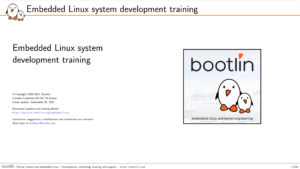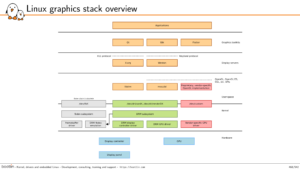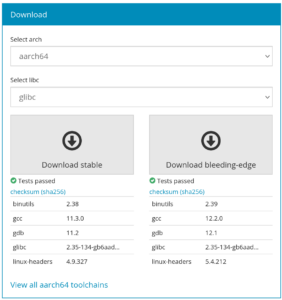 Our Embedded Linux system development course has been for many years one of our most popular training courses. It is our course targeted at engineers who are getting started with Linux on embedded systems, and need to understand the big picture, but with a sufficiently deep level of details. It describes the overall structure of an embedded Linux system, and teaches step by step how it is build: cross-compilation toolchain, bootloader, Linux kernel, minimal root filesystem, storage, integration of user-space components, build systems, etc.
Our Embedded Linux system development course has been for many years one of our most popular training courses. It is our course targeted at engineers who are getting started with Linux on embedded systems, and need to understand the big picture, but with a sufficiently deep level of details. It describes the overall structure of an embedded Linux system, and teaches step by step how it is build: cross-compilation toolchain, bootloader, Linux kernel, minimal root filesystem, storage, integration of user-space components, build systems, etc.
Even though this course has seen many small updates throughout the years to use newer versions of the different software components and various improvements and updates to the training materials, the course had remained fundamentally the same for quite some time. However, we had identified a number of areas on which we wanted to make some more fundamental changes, and we’ve taken the chance of the summer season to prepare a brand new version of this course, with many major changes and improvements.
This updated version of the course is now available, and as usual with Bootlin its training materials are freely available:
 Compared to our previous version of this course, the main changes are:
Compared to our previous version of this course, the main changes are:
- Major rewrite of the lecture section on bootloader and firmware, to better cover UEFI, Trusted Firmware (TF-A), Trusted Execution Environment, and overall reflect the increased complexity of the booting process of modern embedded platforms. The corresponding practical lab also makes use of TF-A to illustrate this.
- Addition of a new section on Accessing hardware devices with many details on the Device Tree, how to identify kernel drivers for devices, and what are the typical interfaces in Linux to access hardware. This is illustrated by a new lab in which we manipulate GPIOs, LEDs, add support for a sound card connected over USB, and add support for a joystick connected over I2C, which extending the Device Tree and manipulating pin-muxing.
- Removal of the practical lab on flash filesystems, due to the progressively reducing number of platforms that use raw NAND flash. We still have a lecture on how raw flash memory is handled in Linux (MTD, UBI, UBIFS), but no longer a practical lab, in order to spend time on topics that are more commonly relevant.
- A major rework of the final part of the course which covers the user-space stack, with the aim of showing how to build a reasonably realistic product:
- We explain and demonstrate how to cross-compile and integrate manually libraries and applications in an embedded Linux system. We illustrate this by cross-compiling alsa-lib and alsa-utils to play audio with our USB audio device, libgpiod to manipulate GPIOs, and ipcalc to manipulate the Meson build system.
- We then explain the concepts and principles behind embedded Linux build systems (with a focus on Buildroot and Yocto), as well as binary distributions. We illustrate this by using Buildroot to build a complete embedded Linux system, which uses mpd as an audio player daemon.
- We then cover open-source licensing topics.
- We then cover the major Linux software stacks for graphics, multimedia, networking, as well as systemd and D-Bus. We illustrate this by changing our system to use systemd as an init system, and use udev for device management.
- Finally, we cover application development and debugging: how to cross-compile your own application, how to debug it, using strace, ltrace, gdb, perf, valgrind. We illustrate this by implementing an application that allows to use an I2C-connected joystick to control the audio playback of an audio playlist. This application is then analyzed and debugged using the relevant debugging tools.
- The real-time Linux part of the course has been removed from the course, as we now have a dedicated real-time Linux with PREEMPT_RT course, which goes into many more details on this topic.
The course is currently delivered with practical labs done on the STM32MP1 platform from ST, but we intend to port it on the BeagleBone Black and Qemu as well. In any case, the course is very generic and relevant for all embedded Linux projects, regardless of the specific hardware platform being used.
This new edition has already been delivered to several customers, both on-line and on-site. All our slots for 2022 are already fully booked, but we do offer for 2023:
- A public on-line session on January 30, 31, February 2, 3, 6, 7, 9, 2023, from 2:00 PM to 6:00 PM UTC+1. Registration is accessible directly online. This is the best option to train a few engineers from your team.
- Private sessions, either on-line or on-site, upon request. You can contact us to discuss the details and get a quote.
We are really looking forward to continuing to share our knowledge about embedded Linux with even more engineers, and are confident that this updated version of the course will make this knowledge sharing even more efficient and fruitful.
 Bootlin is really happy to welcome another engineer in its team: Alexis Lothoré, who joined us on January 3, 2023.
Bootlin is really happy to welcome another engineer in its team: Alexis Lothoré, who joined us on January 3, 2023.

 Since its inception, Bootlin has offered training courses on technical topics related to the use of Linux in embedded systems, with freely accessible training materials, and trainers with in-depth and real-life experience in their field. Based on these ideas, we have progressively extended our training portfolio over the years.
Since its inception, Bootlin has offered training courses on technical topics related to the use of Linux in embedded systems, with freely accessible training materials, and trainers with in-depth and real-life experience in their field. Based on these ideas, we have progressively extended our training portfolio over the years.

 The
The  We are happy to announce that
We are happy to announce that